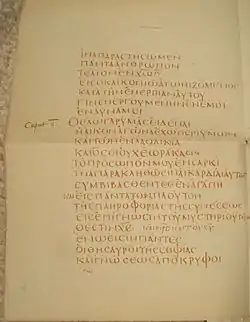Colossians 3
Colossians 3 is the third chapter of the Epistle to the Colossians in the New Testament of the Christian Bible. Traditionally, it is believed to be written for the church in Colossae by Apostle Paul, with Timothy as his co-author, while he was in prison in Ephesus (years 53-54), although there were debatable charges that it is the work of a secondary imitator or that it was written in Rome (in early 60s).[1] This chapter contains the advice how Paul wants the Colossians to live.[2]
| Colossians 3 | |
|---|---|
 A page showing the Greek text of Epistle to the Colossians 1:28–2:3 on Codex Claromontanus from ca. AD 550. | |
| Book | Epistle to the Colossians |
| Category | Pauline epistles |
| Christian Bible part | New Testament |
| Order in the Christian part | 12 |
Text
The original text was written in Koine Greek. This chapter is divided into 25 verses.
Textual witnesses
Some early manuscripts containing the text of this chapter are:
- Papyrus 46 (c. AD 200)
- Codex Vaticanus (325–350)
- Codex Sinaiticus (330–360)
- Codex Alexandrinus (400–440)
- Codex Ephraemi Rescriptus (c. 450; complete)
- Codex Freerianus (c. 450; extant verses 5–8, 15–17, 25)
- Codex Claromontanus (c. 550; in Greek and Latin)
- Codex Coislinianus (c. 550; extant verses 1–11)
How the Colossians Ought to Live (3:1—21)
Paul reminds the people that they are "no longer 'belong to the world' (2:20), but in intimate union with Christ.[2]
Verse 10
- and have put on the new man who is renewed in knowledge according to the image of Him who created him[3]
- "The image": In discussing the renewal of the "new humanity", Paul sees Christ – the image of God the creator – as the "paradigm for believers' transformation" (Romans 8:29; 1 Corinthians 15:49; 2 Corinthians 3:18).[4]
Verse 11
- where there is neither Greek nor Jew, circumcised nor uncircumcised, barbarian, Scythian, slave nor free, but Christ is all and in all.[5]
Verse 16
- Let the word of Christ dwell in you richly in all wisdom, teaching and admonishing one another in psalms and hymns and spiritual songs, singing with grace in your hearts to the Lord.[7]
- "The word of Christ": may mean "the word spoken by Christ" ("Christ's message" in GNB), or "the message about Christ" (CEV, "about the Messiah" in HCSB).[8] Some Greek manuscripts read "God" (θεοῦ, for examples, Codex Alexandrinus, Ephraemi Rescriptus, 33), or "Lord" (κυρίου; only Codex Sinaiticus* and Freerianus), but all others have "Christ" (Χριστοῦ).[8]
Verse 17
- And whatever you do in word or deed, do all in the name of the Lord Jesus, giving thanks to God the Father through Him.[9]
- "Whatever you do in word or deed": This includes anything, in preaching the Christ's word, hearing the Gospel, singing psalms, hymns, and spiritual songs, and in conversation with each other; or in any actions, relating to God or man, or one another, in the world or church.[10]
- "Do all in the name of the Lord Jesus": both in the strength of Christ, and according to the will of Christ as declared in the Gospel, calling his name for help in doing every duty, only for his honor and glory.[10]
- "Giving thanks to God, and the Father by him": (cf. Ephesians 5:20) directed to God, the Father of Lord Jesus Christ, and him alone.[10]
Exhortation for slaves (3:22–25)
As in the Epistle to the Ephesians, the instructions to slaves are longer than to masters, because they concern not only Christian household slaves, but also slaves working outside households (in agriculture or industry, etc.) and slaves of non-Christian masters.[11] A model on the "mutual responsibilities of slaves and masters within the Christian fellowship" can be viewed in the Epistle to Philemon, where the slaves and masters are brothers in Christ.[12] Slaves (or employees in modern days) to non-Christian masters should work more faithfully, because they are above all the servants of Christ, committed to please him, not the masters, or not fear the earthly masters but in reverence for Christ as the heavenly master (verse 23), and therefore linking the quality of their service to the reputation of Christ or Christianity. [13]
Verse 23
- And whatever you do, do it heartily, as to the Lord and not to men.[14]
See also
References
- Murphy-O'Connor 2007, p. 1191–1192.
- Murphy-O'Connor 2007, p. 1196.
- Colossians 3:10 NKJV
- Harris 2010, p. 133.
- Colossians 3:11 NKJV
- Harris 2010, p. 134.
- Colossians 3:16 NKJV
- Harris 2010, p. 144.
- Colossians 3:17 NKJV
- John Gill's Exposition of the Entire Bible - Colossians 3:17
- Bruce 1984, p. 167.
- Bruce 1984, p. 167–168.
- Bruce 1984, p. 168–169.
- Colossians 3:23 NKJV
Bibliography
- Bruce, Frederick Fyvie (1984). The Epistles to the Colossians, to Philemon, and to the Ephesians. The New International Commentary on the New Testament. 10 (revised ed.). Wm. B. Eerdmans Publishing. ISBN 9780802825100.
- Harris, Murray J. (2010). Colossians and Philemon: Exegetical Guide to the Greek. Exegetical guide to the Greek New Testament. 1 (revised ed.). B&H Publishing Group. ISBN 9780805448498.
- Murphy-O'Connor, Jerome (2007). "70. Colossians". In Barton, John; Muddiman, John (eds.). The Oxford Bible Commentary (first (paperback) ed.). Oxford University Press. pp. 1191–1199. ISBN 978-0199277186. Retrieved February 6, 2019.
External links
- Colossians 3 King James Bible - Wikisource
- English Translation with Parallel Latin Vulgate
- Online Bible at GospelHall.org (ESV, KJV, Darby, American Standard Version, Bible in Basic English)
- Multiple bible versions at Bible Gateway (NKJV, NIV, NRSV etc.)
